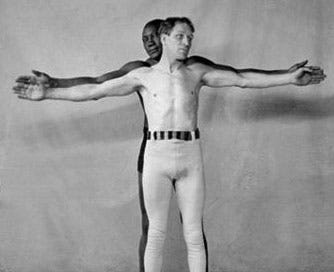I love boxing. I can’t pass up a documentary on boxing. My favorite is Ken Burns’ Unforgivable Blackness: The Rise and Fall of Jack Johnson. I can’t recommend it enough. A thing I notice when I watch these boxing docs is that a boxer doesn’t train just by boxing. They do spar, it’s a part of their training for sure, but they also work on the speed bag, and the heavy bag. They jump rope, and jumping rope is so much more than calisthenic, they work on their rhythm and timing, their speed and mobility. They run, and they train with weights. Some coaches even put their fighters in dance classes. They have them do ballet to make them better boxers.
There are so many skills at work in the boxing ring. The greatest description I’ve heard of boxing is that it’s playing chess under punches. You have to be quick, make the right moves, adjust your strategy while in the ring, being swung on, defense and offense, making decisions at breakneck speed. And I love to think of stand up this way. They say our name and its like that bell ringing, and then we’re live, and they laugh or they don’t and we adjust accordingly, no pause, no starting over. Maybe we get heckled, maybe they don’t get a joke or don’t find it funny, and we just have to keep swinging until we hear that bell again, or see that light in the back of the room to let us know our time is about up.
So, how do you train? Too many comics only spar, which is to say the only way they train is by hitting the open mic nights and trying out their jokes. Ask yourself how you can isolate the different parts of what you do and exercise them.
Writing on social media is a great way work on your writing, to practice getting your words right without delivery.
Do improv. A lot of improv clubs offer drop-in sessions, or you could take an improv class. Its a great workout for your brain, learning to be in the moment, to be quick on your feet. I don’t know if taking ballet will help you with stand up, though I think it might, but improv feels like our version of the boxer taking up dancing.
When you do hit the open mics, make challenges for yourself. Try getting up and not doing your written material. Even if you aren’t normally a crowd work comic, try chatting with the audience to see where it goes. Maybe tell one quick joke at the top to set the table, and then go in. And you can have one quick closing joke to help you finish up if you need it. You can have that closer ready and not use it if things go well.
Know the difference between a work out room, and the rooms where you work. At open mics you should be taking chances, stepping outside of your usual style. If you’re not topical, open up Google News and see how many stories you can riff on. If you’re not usually a one liner, try doing some one line jokes. If you normally are a comic who trades in short jokes, try telling a story. And do this at your desk too, practice writing in different styles, even if you don’t share it with anyone. You’re dancing, not because you want to be a dancer but because it’s making you. a better fighter.
Also, dance. I don’t mean that as an analogy. Actually take a ballet, or ballroom class. Or paint. Or sculpt. Learn to play the guitar. I think it’s good for you as a person, and as a comedian to do other creative, artistic things. I think it exercises your brain in ways you’re not even aware of, but it also nurtures your brain. Most successful artists I know do more than one thing. I know comic book artist/writers who play music, and musicians who paint, and comedians who breakdance or write poetry.
And also take a break from all this working out and challenging yourself, and just go up and do your best set when you need to kill to recharge your batteries. That has value too. Because sparing is a valuable part of training, it’s just not the only part.
Okay champ, get in there and mix it up. Ding Ding!!!!





Amen! https://open.substack.com/pub/johnnogowski/p/the-greatest-sports-event-ever?r=7pf7u&utm_medium=ios
All of this is excellent advice.